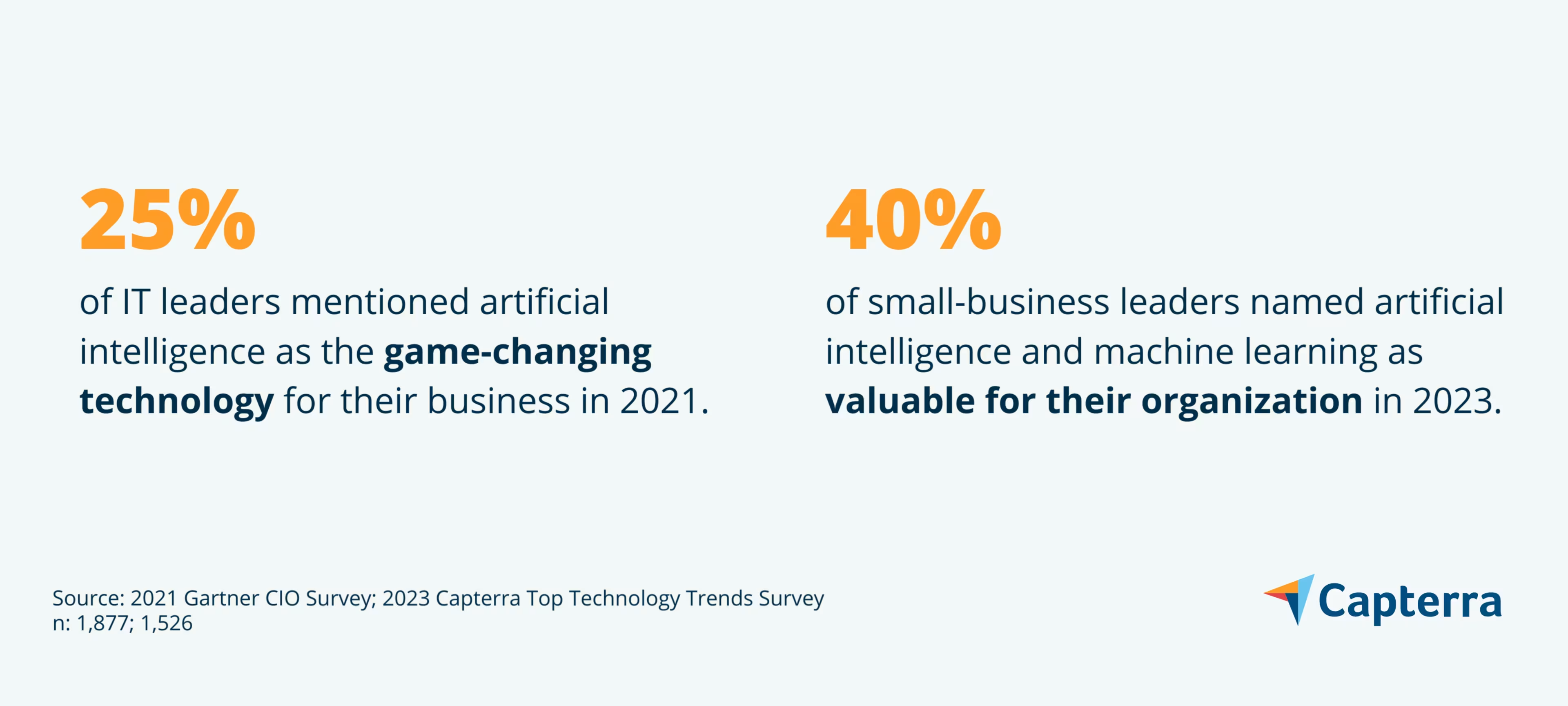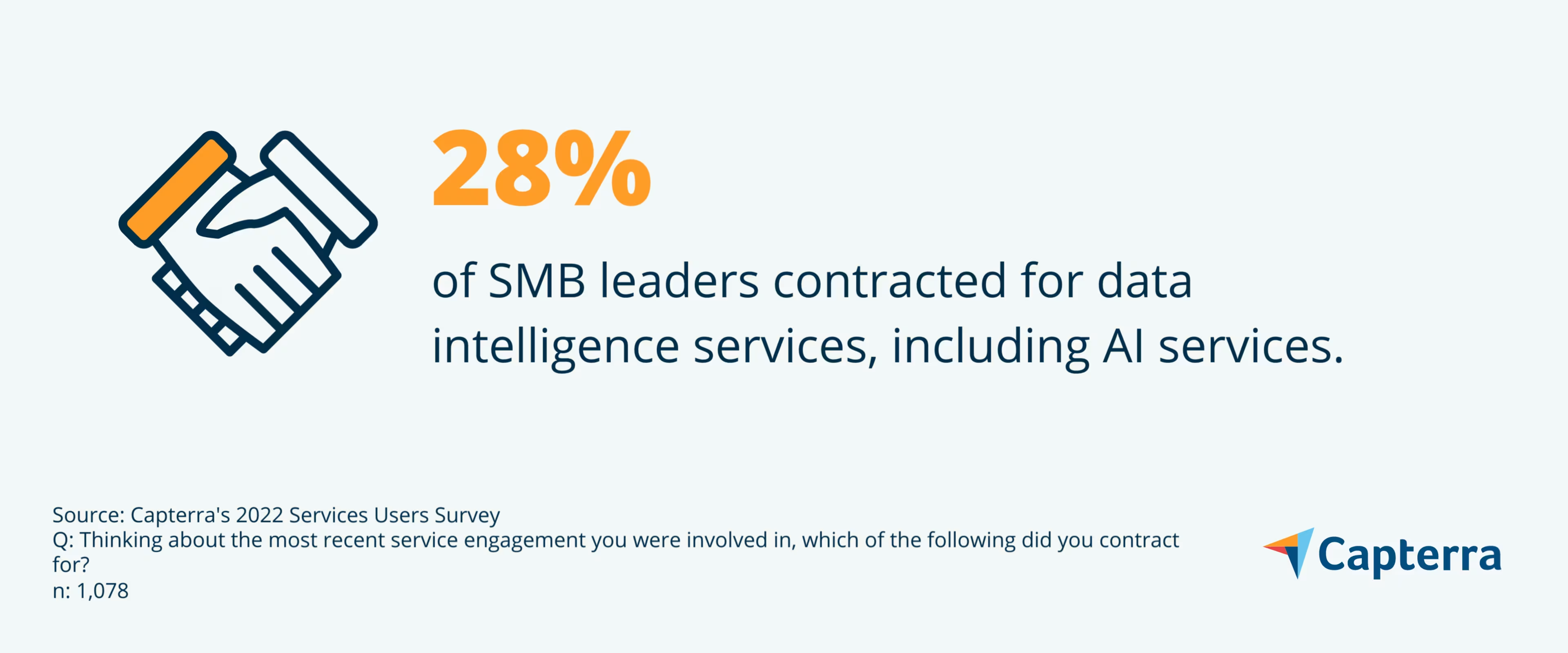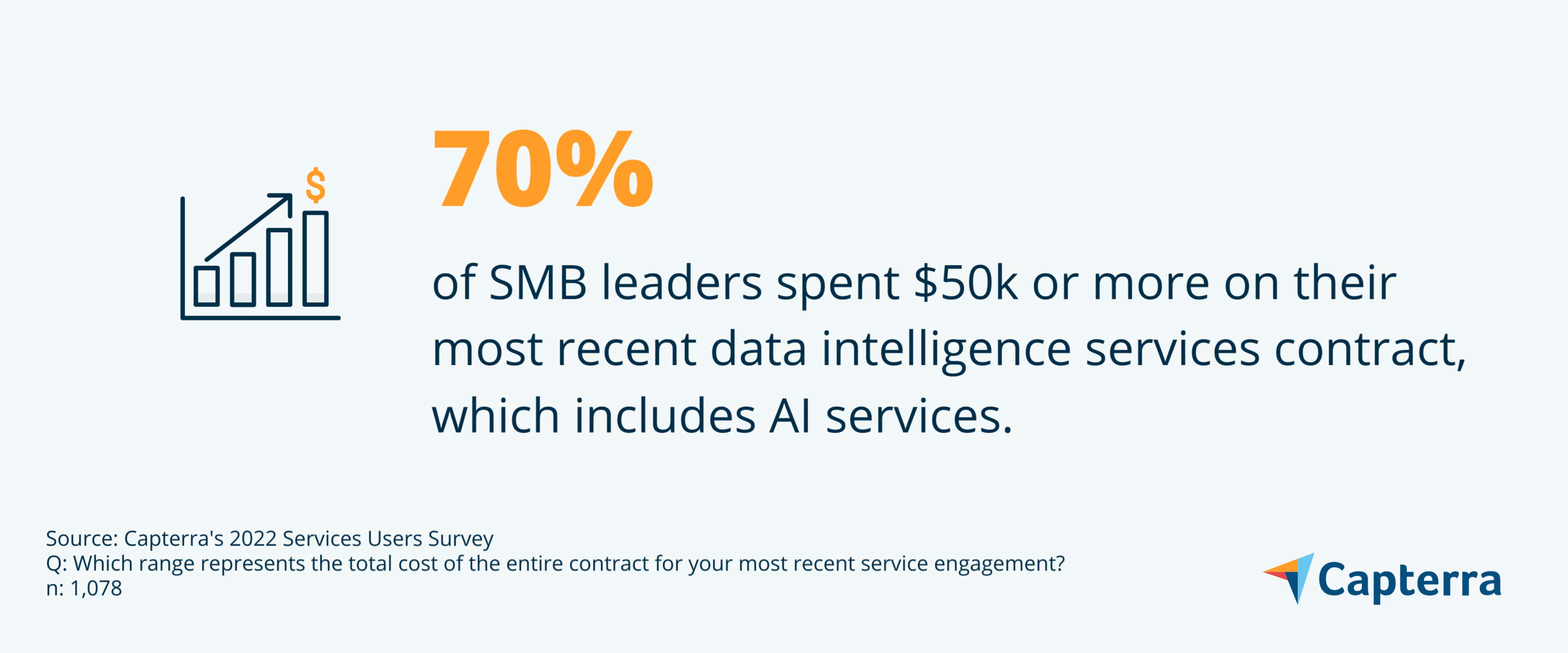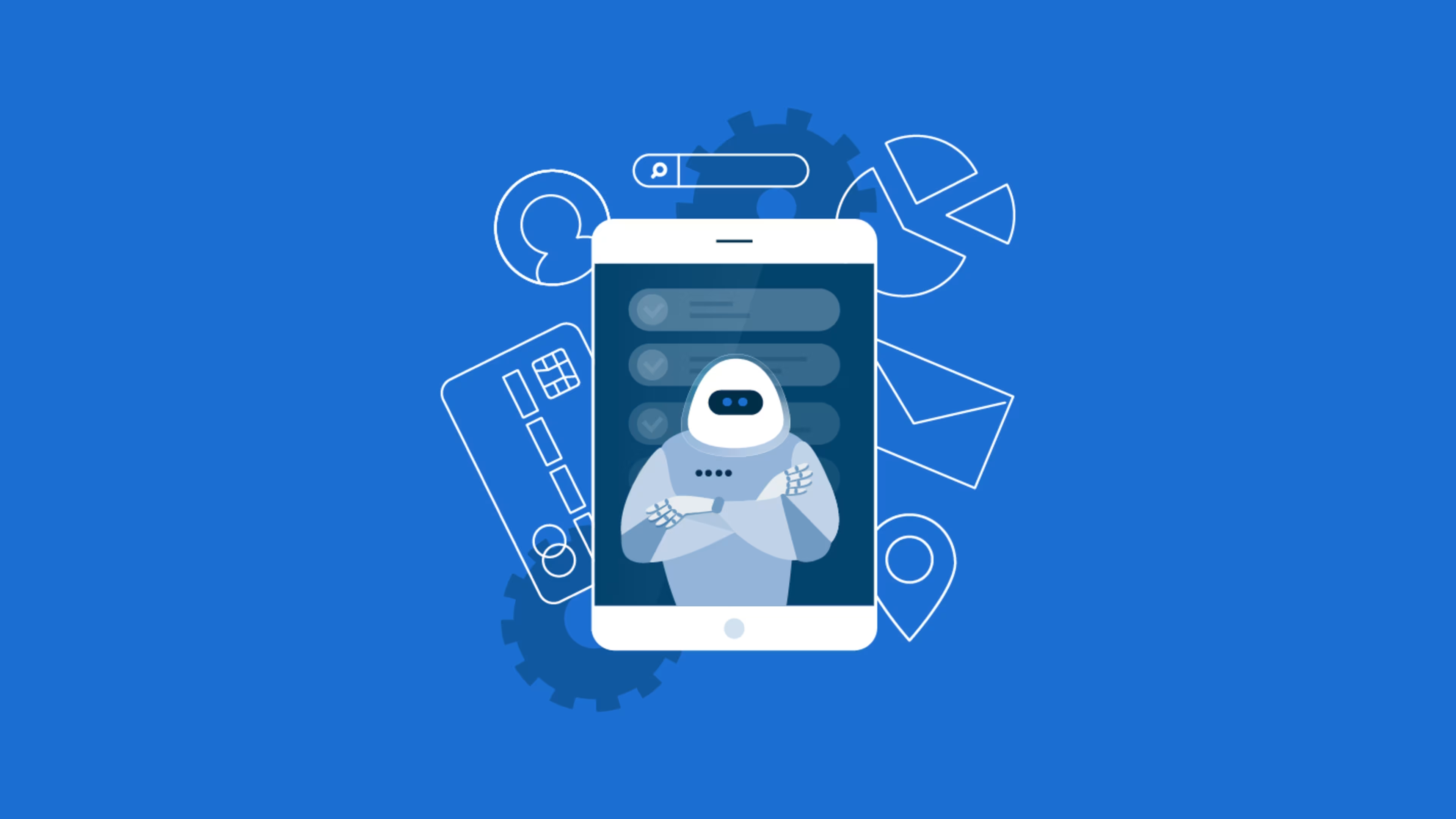Decide whether AI-as-a-Service is right for your team with this guide.
In a recent Gartner survey, a quarter of IT leaders pointed to artificial intelligence (AI) as the game-changing technology for their company in 2021[1]. In addition, 40% of small-business leaders in Capterra’s 2023 Top Technology Trends Survey* named AI and machine learning as valuable or potentially valuable emerging technologies for their organization.

Now is the time to harness the power of AI tools for your own business, but depending on your industry, needs, and budget, it might make more sense to invest in AI-as-a-Service, or AIaaS. To help you decide whether AI-as-a-Service is right for your team, we’ll walk you through insights from Gartner research as well as surveys that show how your peers are using AI services.
What is AI-as-a-Service?
AIaaS is the outsourcing of AI services to third-party vendors. It’s a great option for businesses interested in exploring ready-to-use AI solutions at a lower initial cost and commitment level than what it would take to develop an AI solution in-house. In fact, 28% of SMB leaders invested in AI services over the past 18 months according to our 2022 Services Users Survey**.

These services range from AI strategy to AI software design, deployment, and management. In addition, AI vendors assist with data services such as curation, cleaning, assembling, modeling, audit, and management. Gartner[1] predicts that by 2024, over half of all organizations will have leveraged AI service providers for AI implementation, consulting, or managed services.
Below are some commonly offered AI services explained in detail.
Natural language processing (NLP) uses AI algorithms to help computers understand human language in the form of text and speech. NLP systems run on deep learning and machine learning models and are capable of understanding, analyzing, and extracting meaning from text and speech.
Machine learning (ML) systems use AI to extract insights from data and create logical data models. These ML models are used in business processes to make informed decisions and solve complex problems. ML algorithms are used to build self-driving cars, product recommendation systems, and language translation systems.
A virtual personal assistant (VPA) is an AI service that uses deep learning to conduct personalized conversations with users. It understands voice commands and performs tasks as directed by the user. A digital virtual assistant helps automate tasks with less human interaction and fewer errors.
Robotic process automation refers to the use of an AI solution to perform complex or repetitive tasks. The system is programmed to handle end-to-end task management from alignment to delivery. Process automation is used for email, report generation, inventory management, big data processing and storage, and much more.
Data analytics uses AI to discover insights, identify new patterns, and form relationships in data. In addition, AI-powered data analytics can help create predictive systems and algorithms that test and validate the use of insights in solving complex business problems. Automated data testing assists in more accurate decision-making.
Through these services, AI companies transform AI technology into a cloud-based AIaaS solution that allows you to meet your business goals without requiring a large initial investment. These AI software platforms are developed by data scientists, analysts, and/or engineers based on the analysis of business challenges and goals.
Why should I invest in AI-as-a-Service?
There are three main reasons to invest in AI-as-a-Service.
1. You have large amounts of data to analyze
Machine learning is useful for the processing and analysis of high volumes of data assets, otherwise known as big data. It helps businesses by applying labels to data and extracting insights that you can then use to inform business decisions or present to stakeholders.
2. You have processes that are better handled by machines than humans
Wanting to spare your employees from the boredom and tedium of repetitive tasks is a perfectly valid reason to invest in AI-as-a-Service. Whether those tasks include mass emails, data entry, or answering customer service questions, AIaaS can free your team for higher-value tasks.
3. You would benefit from trend prediction or forecasting
If your industry requires you to keep a pulse on trends—or better yet, stay one step ahead of them—you would benefit from investing in AIaaS for its predictive analytics capabilities. Below, we’ll delve deeper into specific industries that benefit from trend prediction or forecasting.
Find the right service for your business in Capterra's list of artificial intelligence companies in the U.S.
What are some industries that benefit from AI-as-a-Service?
For the reasons we just covered, AIaaS is more useful for some industries than others. Examples of industries that would benefit from AIaaS include construction, financial services, healthcare, and real estate.
Construction
One industry in particular that benefits from AI’s capacity to process and analyze big data is construction. Construction uses machine learning to provide critical information and insights from the beginning of the planning phase.
AI services can help construction companies identify potential issues with coordination of resources, labor, equipment, potential problems on the site, and even seasonal weather changes that teams can address before issues cause delays and cost overruns. They can also provide more accurate cost estimates and help to reduce material waste and human errors.
Financial services
AI benefits the financial services industry in several ways. It can detect fraudulent transactions, automate routine tasks (e.g., record maintenance and invoice processing), and help business leaders make informed decisions through data analysis.
Financial services companies can also leverage AI to understand their customer and business lines more effectively. One example provided by Forbes[2] is the use of machine learning to power financial product recommendation engines. Machine learning combines personal data such as credit scores and balances, then suggests products that will fit a customer’s needs.
Healthcare
As in the construction industry, healthcare professionals also benefit from AI’s capacity to manage high volumes of data. Other benefits of AI on healthcare include:
Improved patient experience through AI-powered chatbots. This AI application provides instant answers to patients’ questions on topics such as bill payments, appointment scheduling, and medication refills. They can also be the first point of contact for symptom identification. They’re user-friendly, interactive, and available 24/7.
Increased support for both patients and staff through virtual personal assistants. Unlike the chatbot, a virtual assistant is meant to assist patients every step of their treatment by providing consistent support instead of one-off interactions. VPAs also support administrative staff by streamlining clinical workflows within a medical practice.
Optimized performance and operational efficiency with intelligent decision support systems (IDSS). An IDSS uses patient data and machine learning to help practitioners diagnose diseases accurately.
Real estate
The main way that AI benefits real estate agents is through predictive data analytics. AI can help agents gather data about their clients and rapidly evolving markets, which can then be used to make informed decisions about properties and real estate investments.
AI also benefits real estate agents by extracting customer data from documents, which helps them properly segment clients into leads, buyers, sellers, or investors. Proper segmentation offers agents the additional benefits of more accurate reporting and engagement tracking.
What are the pros and cons of AI-as-a-Service?
If your business falls within an industry that would benefit from AI-as-a-Service, here are some pros and cons to weigh before investing in an AI company.
Pros of AI-as-a-Service
AI solutions are tailored to your needs: AIaaS provides you with the expertise of qualified engineers who possess the knowledge and experience needed to turn AI techniques into efficient business solutions. They’ll assist you with end-to-end solutions, from identifying the business challenge to deploying AI software tools.
You’ll only pay for what you use: AI services vendors provide ready-made AI solutions to address business problems. This helps save costs that you’d otherwise spend on software research and development of the software. You’ll also have the flexibility to choose specific AI tools based on your needs instead of packaged software solutions.
Implementation is quick and easy: AI services vendors, especially ones that provide software tools, usually offer quick and accurate implementation into your business processes followed by continuous support. This saves you time and reduces the number of errors that would have occurred while trying to build and implement AI tools in-house.
Cons of AI-as-a-Service
Security can be a concern. Sometimes investing in cloud providers means trading privacy for convenience, as sharing high volumes of data with third-party vendors can put you at risk for security breaches. It’s a good idea to ask potential AI service providers about their policies and practices on data storage, access, and transit to servers.
You’re dependent on a vendor. When you rely on a third party to provide information, you’re subject to their turnaround time. You also won’t have access to the processes or AI algorithms your provider uses to achieve results. In other words, you won’t learn as much as you would while developing and implementing your own in-house solution.
Long-term costs can be high. While investment in an AI platform falls between $4 to $100 on a per-user, per-month basis, 70% of SMB leaders spent $50k or more on their most recent data intelligence services contract in the past 18 months**.

Find common pricing models for AI services vendors in the table below:
Pricing model | Description |
Hourly | AI companies charge a specific amount for every hour of work they do. The hourly price is based on the hours the team members spend, from consultation to the deployment of the AI solution. Cost of services further varies based on the types of services, such as customized, packaged, or industry-specific. |
Project-based | The project’s cost is set beforehand with the client. It’s based on the number of days and hours required to develop the AI solution, the number of experts involved, the complexity of the challenge, and ongoing support. It’s best for projects requiring continuous support, iterations, and testing. |
Subscription-based | AI companies offering software solutions often follow this model. They group together specific features of AI-powered software tools and build packages that are priced according to their complexity. For instance, plans with data processing features will cost less than plans offering process automation features. |
/ Ready to invest in AI-as-a-Service? Here’s what to look for
If AI-as-a-Service is right for you, your first step is to browse our database of AI service providers. Here are some key considerations to finding the best AI company:
Integration capabilities: Integrating new software tools into existing business applications can disrupt your workflow. Ask potential providers how their tools will integrate with your existing business applications. You can also opt for AI software solutions offered by managed service providers via third-party hosting.
Technical support: Make sure your potential provider can guide your team through the implementation process or solve technology-related queries at any given point in time. In addition, it should assist in training employees on how to leverage the adopted AI solutions to get the work done.
Scalability of services: AIaaS is expensive, so it’s important to assess scalability with changing business needs and objectives. Analyze AI services specific to your business model or industry needs to see how well they’ll suit your business goals.
Transparency in pricing models: The high cost of AIaaS makes it imperative to understand the pricing model offered by your selected service provider. Most AIaaS companies charge for each project, the number of hours utilized, or the tool’s features. Select a vendor that aligns with your requirements without exceeding your budget.
